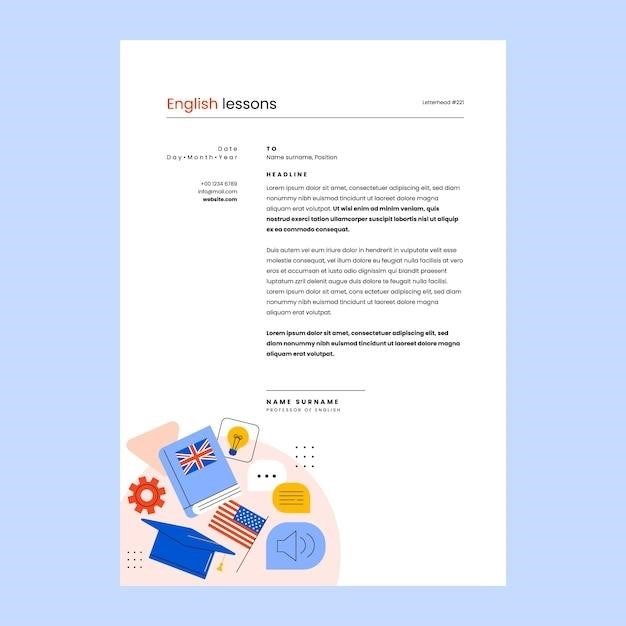
Examples of Adult Autoimmune Accommodation Letters PDF⁚ A Comprehensive Guide
This guide provides a comprehensive overview of adult autoimmune accommodation letters‚ offering insights into their importance‚ legal framework‚ and practical examples. We delve into crafting effective letters‚ outlining essential components‚ and providing sample letters tailored to specific autoimmune conditions like rheumatoid arthritis and depression.
Introduction⁚ Understanding the Need for Accommodation
Navigating the workplace with an autoimmune condition can present unique challenges‚ often requiring adjustments to accommodate the physical‚ mental‚ and emotional demands of the job. These conditions can manifest in diverse ways‚ impacting energy levels‚ mobility‚ cognitive function‚ and overall well-being. An accommodation letter serves as a formal request for modifications to the workplace environment‚ allowing individuals to perform their job duties effectively and maintain their health.
Understanding the need for accommodation is paramount. It acknowledges the potential limitations imposed by an autoimmune disease and seeks to bridge the gap between an individual’s capabilities and the demands of their role. This approach fosters a more inclusive and supportive work environment‚ enabling individuals to contribute their skills and talents while managing their health effectively.
Legal Framework⁚ ADA and ADAAA Protections
The legal framework surrounding workplace accommodations for individuals with disabilities is grounded in the Americans with Disabilities Act (ADA) and its subsequent amendment‚ the ADA Amendments Act (ADAAA). These acts provide comprehensive protection against discrimination based on disability and mandate reasonable accommodations for qualified individuals.
The ADAAA expanded the definition of “disability” to encompass a broader range of conditions‚ including those affecting the immune system. This clarification ensures that individuals with autoimmune diseases are explicitly protected under the law and entitled to reasonable accommodations.
The ADA and ADAAA require employers to engage in an interactive process with employees seeking accommodations. This involves a collaborative effort to identify and implement effective solutions that allow the employee to perform their essential job functions without undue hardship to the employer.
What are Reasonable Accommodations?
Reasonable accommodations are modifications or adjustments to the work environment that enable individuals with disabilities to perform their job duties effectively. These accommodations should be tailored to the specific needs of the employee and their disability‚ ensuring that they can participate in the workplace on an equal footing with their non-disabled colleagues.
The determination of what constitutes a reasonable accommodation is a case-by-case assessment‚ taking into account factors like the nature of the disability‚ the employee’s job responsibilities‚ and the employer’s resources.

Examples of reasonable accommodations might include flexible work schedules‚ modified work stations‚ assistive technology‚ or changes to the physical environment. The key principle is that accommodations should be effective in addressing the employee’s disability-related limitations while minimizing any undue hardship on the employer.
Examples of Reasonable Accommodations
Reasonable accommodations for individuals with autoimmune conditions can vary widely depending on the specific condition and its impact on the employee’s ability to perform their job. Here are some common examples⁚
- Flexible Work Schedules⁚ Allowing employees to adjust their start and end times‚ or take breaks during the day to manage fatigue or pain‚ can be essential for individuals with autoimmune conditions.
- Modified Workstations⁚ Adjusting the height of desks‚ providing ergonomic chairs‚ or installing assistive devices can make a significant difference for employees experiencing joint pain‚ fatigue‚ or other physical limitations.
- Remote Work Options⁚ For some employees‚ working from home can help them manage their symptoms and maintain productivity‚ especially during periods of flare-ups.
- Leave of Absence⁚ Extended leave for medical treatments‚ hospitalizations‚ or periods of intense symptom management can be crucial for employees with autoimmune conditions.
- Job Reassignment⁚ In certain cases‚ reassignment to a less physically demanding role may be necessary to accommodate an employee’s limitations.
Remember‚ the specific accommodations needed will vary based on individual circumstances‚ and the employer and employee should work together to find solutions that are effective and feasible.
Examples of Unreasonable Accommodations
While the ADA requires employers to provide reasonable accommodations‚ there are limits to what they are obligated to provide. Certain requests‚ while well-intentioned‚ might be considered unreasonable due to their significant cost‚ disruption‚ or potential safety risks. Here are some examples of accommodations that might be deemed unreasonable⁚
- Hiring a Personal Assistant⁚ Employers are generally not required to provide personal assistants for employees‚ even if they have significant physical limitations. This type of assistance is typically considered a personal need‚ not a workplace accommodation.
- Complete Job Redesign⁚ While employers may be willing to make minor modifications to job duties‚ they are not obligated to completely redesign a position to accommodate an employee’s limitations.
- Exclusive Use of a Private Restroom⁚ Employers are not required to provide employees with exclusive access to a private restroom‚ as this could pose logistical and safety concerns for other employees.
- Unlimited Leave of Absence⁚ While employees may be entitled to reasonable leave for medical reasons‚ employers are not obligated to grant unlimited leave‚ as this could disrupt operations and create unfair burdens on other employees.
- Accommodation that Creates Safety Hazards⁚ Employers are not required to provide accommodations that create safety hazards for the employee or other individuals in the workplace.
It’s important to remember that what constitutes a reasonable accommodation is subject to interpretation‚ and the specifics of each situation should be considered on a case-by-case basis.
Requesting Accommodation⁚ The Process
Requesting a workplace accommodation is a process that involves communication‚ documentation‚ and collaboration. The ADA encourages an interactive process between the employee and the employer to determine the most appropriate and effective accommodation. Here’s a breakdown of the general process⁚
- Initiate the Request⁚ The employee should first inform their employer about their need for an accommodation. This can be done verbally or in writing‚ but it’s recommended to provide a formal written request for documentation purposes.
- Provide Medical Documentation⁚ The employer may request medical documentation from the employee’s healthcare provider‚ outlining the disability and the need for specific accommodations.
- Engage in the Interactive Process⁚ The employee and employer should engage in open and honest discussions to explore potential accommodations. This may involve brainstorming solutions‚ considering alternative options‚ and assessing feasibility.
- Employer’s Response⁚ The employer should respond to the accommodation request within a reasonable timeframe. They may agree to the requested accommodation‚ propose alternative options‚ or explain why the request cannot be granted.
- Appeal⁚ If the employee is dissatisfied with the employer’s response‚ they may have the right to appeal the decision. This process often involves filing a complaint with the Equal Employment Opportunity Commission (EEOC) or a similar state agency.
It’s important to remember that the interactive process is a collaborative effort‚ and both the employee and the employer have responsibilities to engage in good faith discussions and explore potential solutions.
Crafting Your Accommodation Letter⁚ Key Components
A well-crafted accommodation letter is crucial for effectively communicating your needs and securing the support you require. Here are the key components to include in your letter⁚
- Introduction⁚ Begin by clearly stating your purpose‚ which is to request reasonable accommodations for your disability. Introduce yourself‚ your position‚ and the date of your employment.
- Disability Disclosure⁚ Briefly describe your disability‚ highlighting its impact on your ability to perform essential job functions. You can mention your diagnosis‚ but focus on the specific functional limitations that require accommodation.
- Requested Accommodations⁚ Outline the specific accommodations you need to perform your job effectively. Be clear‚ concise‚ and specific about each accommodation‚ explaining how it will help you fulfill your job duties.
- Supporting Documentation⁚ Offer to provide supporting documentation‚ such as a medical letter from your healthcare provider‚ confirming your disability and the necessity of the accommodations.
- Availability for Discussion⁚ Express your willingness to engage in an interactive process with your employer to discuss the requested accommodations and explore alternative options if necessary.
- Contact Information⁚ Provide your contact information‚ making it easy for your employer to reach you for further discussions or to schedule a meeting.
Remember‚ your accommodation letter should be professional‚ respectful‚ and clearly articulate your needs. It’s a valuable tool for initiating the process of securing the accommodations you need to thrive in your workplace.
Sample Accommodation Letter⁚ Rheumatoid Arthritis
Dear [Employer Name]‚
I am writing to request reasonable accommodations for my rheumatoid arthritis‚ a disability as defined by the Americans with Disabilities Act (ADA). I have been employed as a [Your Position] at [Company Name] since [Start Date].
My rheumatoid arthritis causes significant joint pain‚ inflammation‚ and fatigue‚ particularly in my [Affected Joints]. These symptoms can fluctuate‚ making it challenging to perform certain tasks‚ such as [Specific Job Tasks].
To effectively manage my condition and continue performing my job duties‚ I request the following accommodations⁚
- Flexible work schedule⁚ I would like to request a flexible work schedule‚ such as [Specific Request‚ e.g.‚ starting later or leaving earlier] to accommodate doctor’s appointments and physical therapy sessions.
- Regular breaks⁚ I would appreciate the opportunity to take short‚ regular breaks throughout the day to rest and manage my pain and fatigue.
- Ergonomic adjustments⁚ I would like to request ergonomic adjustments to my workstation‚ such as [Specific Requests‚ e.g.‚ an adjustable chair‚ keyboard tray‚ or footrest] to minimize strain on my joints.
I am happy to provide supporting documentation from my rheumatologist outlining my condition and the need for these accommodations. I am also available to discuss these requests further at your convenience.
Thank you for your understanding and consideration. I look forward to continuing to contribute to [Company Name] with the appropriate accommodations.
Sincerely‚
[Your Name]
Sample Accommodation Letter⁚ Depression
Dear [Employer Name]‚
I am writing to request reasonable accommodations for my depression‚ a disability as defined by the Americans with Disabilities Act (ADA). I have been employed as a [Your Position] at [Company Name] since [Start Date] and have consistently performed my job duties to the best of my abilities.
My depression can impact my concentration‚ motivation‚ and energy levels‚ making it challenging to maintain a consistent work schedule and perform certain tasks‚ such as [Specific Job Tasks]. I am currently under the care of a mental health professional and am actively engaged in treatment to manage my condition.
To effectively manage my depression and maintain my productivity‚ I request the following accommodations⁚
- Flexible work schedule⁚ I would like to request a flexible work schedule‚ such as [Specific Request‚ e.g.‚ starting later or leaving earlier] to accommodate therapy appointments and allow for time to manage my mental health.
- Quiet work space⁚ I would appreciate a quiet work space where I can focus without distractions. This could include a private office or designated quiet area.
- Reduced workload⁚ I would like to request a temporary reduction in my workload to alleviate stress and allow me to focus on my mental well-being.
I am happy to provide supporting documentation from my therapist outlining my condition and the need for these accommodations; I am also available to discuss these requests further at your convenience.
Thank you for your understanding and support in helping me maintain a healthy work-life balance.
Sincerely‚
[Your Name]
Supporting Documentation⁚ Medical Letters and Resources
Providing your employer with supporting medical documentation is crucial when requesting workplace accommodations. A letter from your healthcare provider outlining your condition and limitations is often required. This letter should clearly state your diagnosis‚ how it affects your ability to perform job duties‚ and the specific accommodations needed to ensure you can work effectively.
The Job Accommodation Network (JAN) offers resources to help you navigate this process. They provide sample medical documentation templates and guidance on what information should be included in a letter. You can also utilize resources from the Immune Deficiency Foundation (IDF)‚ which provides a Patient & Family Handbook for Primary Immunodeficiency Diseases with relevant chapters on workplace accommodations.
Remember to maintain confidentiality regarding your medical information. Disclosing your diagnosis to your employer does not automatically grant them the right to share it with others. Ensure they understand your medical information is confidential and only relevant details needed to implement accommodations will be shared with necessary parties.
Employer Responsibilities⁚ Interactive Process and Undue Hardship
The Americans with Disabilities Act (ADA) and its amendments (ADAAA) require employers to engage in an interactive process with employees seeking reasonable accommodations. This means both parties must work together in good faith to find solutions that allow the employee to perform their essential job functions. The employer should be open to discussing various accommodation options‚ including those proposed by the employee‚ and exploring alternatives that may be equally effective.
However‚ employers are not obligated to provide accommodations that would create an undue hardship. This means the accommodation must be reasonable and not pose a significant financial or logistical burden on the employer. Factors considered include the size of the company‚ its resources‚ and the nature of the requested accommodation. For example‚ a small business with limited resources may be unable to accommodate a request that requires significant structural changes to the workplace.
The U.S. Equal Employment Opportunity Commission (EEOC) provides guidance on the interactive process and undue hardship considerations. If you encounter difficulties with your employer during this process‚ the EEOC can assist you in resolving the issue.
Resources for Further Information and Support
Navigating the complexities of workplace accommodations can be challenging. Fortunately‚ various resources are available to provide guidance and support. The Job Accommodation Network (JAN) is a valuable resource for both employees and employers. JAN offers a wealth of information on reasonable accommodations‚ including sample letters‚ online tools‚ and expert advice. Their website provides comprehensive guidance on the ADA‚ accommodation options‚ and the interactive process.
The Immune Deficiency Foundation (IDF) is another excellent resource for individuals with autoimmune conditions. IDF provides information on understanding your rights under the ADA and ADAAA‚ as well as resources for managing your condition in the workplace. Their website offers a range of materials‚ including fact sheets‚ articles‚ and a patient and family handbook.
In addition to these organizations‚ consider consulting with legal professionals specializing in employment law. They can provide personalized advice and guidance on your specific situation‚ ensuring you understand your rights and options.




